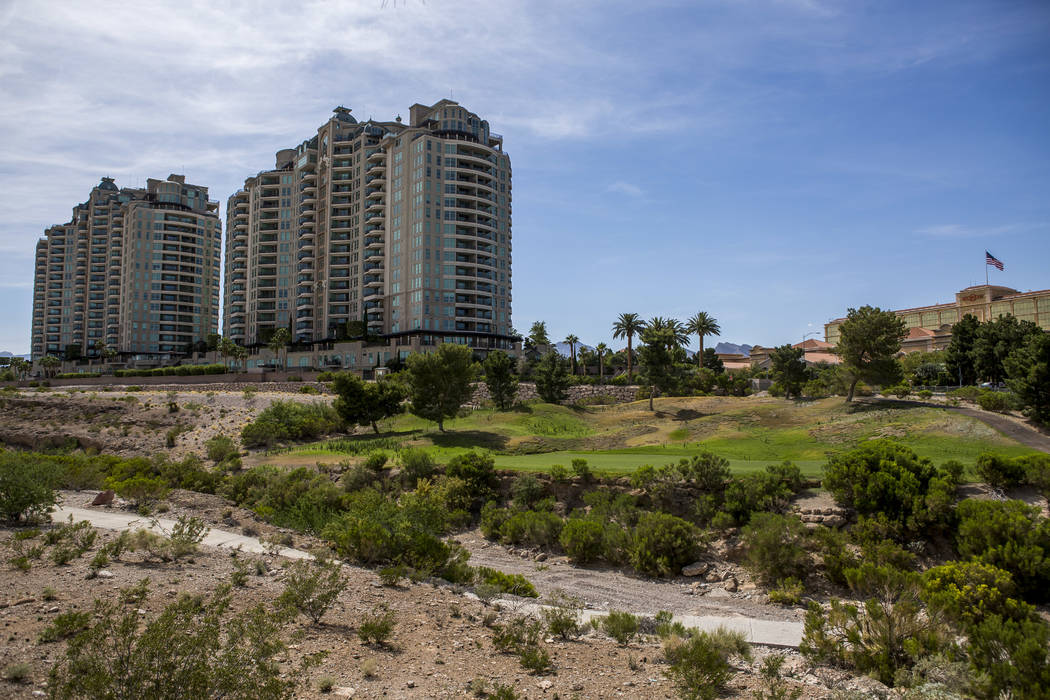Las Vegas eases rules on repurposing golf courses, open spaces
The Las Vegas City Council on Wednesday narrowly repealed controversial rules governing the redevelopment of open spaces and shuttered golf courses in a move that recalled the longstanding fight over a stalled residential project near Summerlin.
Councilwoman Victoria Seaman sponsored the bill, which passed 4-3, that scrapped the stringent rules for such projects. The policy had been established in an ordinance championed by ex-Councilman Steve Seroka in November 2018.
Seaman also sponsored a separate bill to replace the repealed ordinance that removed a list of steps that developers had to follow to develop open space or golf courses. That bill passed 6-1.
The new policy removes paperwork for developers who set out to develop on golf courses or open spaces, including an environmental worksheet and a statement detailing alternatives to a proposed project. It also does away with the provision that studies for traffic, drainage, schools and more be submitted before an application.
Seroka had said those laws were a way to ensure developers considered how new projects would impact neighbors. But critics accused the former policymaker of potentially cooling development across the city with onerous regulations and singling out one developer.
Seroka and EHB Cos. had been at odds over a 250-acre residential project on the defunct Badlands golf course, which winds through the Queensridge neighborhood near Summerlin, leading to several lawsuits over the stalled development and an acrimonious recall effort. Seroka resigned in March.
“I ran for this council seat with a clear agenda: I promised to solve problems for the residents of Ward 2, and I committed myself to serving as a pro-growth, business-friendly representative not only to the families and workers of Ward 2 but to every taxpayer and citizen in the city of Las Vegas,” Seaman said Wednesday.
Seaman, who won a special election last year after Seroka’s resignation, said she believed the repeal-and-replace effort was in sync with those campaign goals. It returned flexibility to policymakers by eliminating regulations that can burden businesses while maintaining the council’s oversight of projects to repurpose golf courses or open spaces, she said.
Queensridge residents, who have rejected the proposed Badlands project amid concerns about high residential density and diminishing property values, did not agree.
“This ordinance is not discriminatory,” Paula Quagliana said about the repealed policy. “All developers are in fact treated equally.”
Todd Bice, a lawyer who acts as legal counsel for many homeowners in Queensridge, said that the repeal-and-replace measure would not resolve lawsuits but instead exacerbate ongoing litigation that has mired the city for years.
It is unclear how softening regulatory requirements will affect a bevy of lawsuits, contending that the city took EHB’s property, unlawfully delayed applications and more. Even Mayor Carolyn Goodman did not appear optimistic about the near-term progress ahead.
“I see this issue continuing on far into the future, and I may not be alive at the time that it’s totally resolved,” she said. “I feel sorry for the fact that we haven’t developed (the golf course).”
Seaman and Goodman were joined in support of the repeal of the development requirements by Councilwoman Michele Fiore and Councilman Brian Knudsen. Fiore suggested that Queensridge opposition to the development was overestimated, and Knudsen said he preferred to spend money on services not litigation.
Dissenting council members questioned why no other developers seemed to oppose the more stringent rules, believing that the additional steps were not preventing development but acting as a safety net for homeowners.
After the repeal passed, however, each council member besides Cedric Crear voted in favor of the replacement.
^
Contact Shea Johnson at sjohnson@reviewjournal.com or 702-383-0272. Follow @Shea_LVRJ on Twitter.























